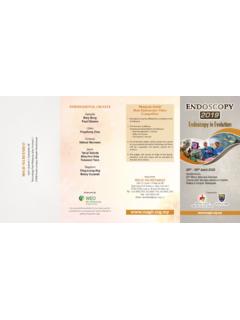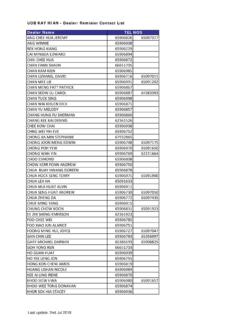Transcription of AOCC big - Welcome to MSGH
1 AOCC 2017. The 5th Annual Meeting of Asian Organization for Crohn's & Colitis The Cutting Edge of Research and Practice in Asian IBD. June 15-17, 2017 I Grand Hilton Seoul, Korea Organized by CONTENTS. Invitation 04. Program at a Glance 05. Scientific Program 06. Call for Abstracts 10. Registration 11. Accommodation 11. Transportation 11. Important Dates Abstract Submission Deadline March 12, 2017. Pre-registration Deadline April 30, 2017. What is AOCC? Asian Organization for Crohn's & Colitis (AOCC) is an organization dedicated to making quality improvements in the management of Asian IBD patients by raising the standard of IBD treatment in scientific and clinical aspects. It was founded in 2013 within congenial countries of Korea, Japan and China. AOCC is still in its infancy, but with rapid increases in the number of IBD patients in Asian regions, the formation of the organization is opportune for Asian nations to unite and work across basic and clinical reseach.
2 The research results concerning IBD in Asian regions are already being noticed internationally. This makes AOCC the comprehensive organization in Asia, and a unique platform for collaboration and the exchange of knowledge. Through annual meetings, we intend to increase awareness of the fast changing disease and patient care by bringing the greatest minds and ideas in Crohn's and Colitis. Why to Attend AOCC 2017? 1 To update and exchange knowledge of basic and clinical research of IBD in Asia through attendance and global networking 2 To stimulate exchange of ideas by hearing experts' debates about the most appropriate approach to the case-based problems related to major IBD topics. 3 To directly gain access to an internationally renowned faculty of top experts in the field of IBD.
3 4 For young doctors, the meeting will provide a stepping stone for them to make an early debut on international stage. 5 To grasp an opportunity for young aspirants to apply for a young investigator award or a travel award. Invitation Dear Colleagues, We are very pleased to invite you to the 5th Annual Meeting of the Asian Organization for Crohn's and Colitis (AOCC2017) which will be held in Seoul, Korea, on June 15-17, 2017. Since the 2nd AOCC meeting was held in Seoul in 2014, the 5th AOCC Meeting has been brought back to Korea. Following the success of previous meetings, next year's meeting will also provide an ideal opportunity to build bridges between medical professionals and scientific experts invited from all over the world, enabling free discussion and the exchange of information.
4 This will generate yet another consensus on perspectives of IBD. treatment in Asian countries, and hopefully worldwide. The theme of The Cutting Edge of Research and Practice in Asian IBD' for the three-day symposium will be introduced by renowned speakers, focusing on and sharing their latest clinical experiences in addition to dealing with new issues along with those currently pending, in an attempt to reach an agreement on standardized guidelines of IBD treatment. We sincerely hope that you will all reap the benefits of discussing and sharing information with our multidisciplinary experts and the time off from your education commitments to enjoy the local opportunities and cultural diversity of Korea. Thank you and we look forward to seeing you all in Seoul.
5 Yours sincerely, Suk-Kyun Yang Yoon Tae Jeen President Congress President Asian Organization for The 5th Annual Meeting of the Asian Crohn's and Colitis Organization for Crohn's and Colitis 04 The Cutting Edge of Research and Practice in Asian IBD. Program at a Glance June 15 June 16 June 17. ROOM 1 ROOM 1 ROOM 2 ROOM 3 ROOM 1 ROOM 2 ROOM 3 ROOM 4. 07:00. Breakfast Breakfast Breakfast Breakfast with with with with 08:00 Master I. Master II. Master III. Master VI. Opening Ceremony 09:00. AOCC Free Paper AOCC Clinical Forum I. Presentation Forum II. Forum III. 10:00. Coffee Break & Coffee Break &. Poster Viewing Poster Viewing 11:00 AOCC. Clinical Basic for Clinical AOCC. Forum I. Forum I. Young Forum IV. Forum III. Doctors 12:00. Registration Luncheon Luncheon Introduction Symposium I.
6 Symposium II. 13:00. ECCO. Educational Coffee Break AOCC. AOCC AOCC. Workshop AOCC & for 14:00 Nurse for Clinical Education Poster Pediatri- Forum Surgeons Forum II. Forum Round cians Coffee Break 15:00 Being at the Coffee Break & Leading Edge in Poster Viewing IBD Care and ECCO Research Educational Workshop 16:00 AOCC. Challenging Basic Closing Remark for Cases Forum II. Nurses Coffee Break 17:00 ECCO. Educational Workshop 18:00. Presidential Dinner Welcome Reception 19:00. The 5th Annual Meeting of Asian Organization for Crohn's & Colitis 05. Scientific Program DAY 1. June 16, 2017 (Fri.). 07:00- Registration ROOM A. Breakfast with Master I. [by Ferring] Qin Ouyang (Sichuan Univ., China). 07:30-08:10 Current Management of Mild to Moderate Jean-Fr d ric Colombel (The Mount Sinai Hospital, USA).
7 Ulcerative Colitis: Expert Insights ROOM B. Breakfast with Master II. [by Celltrion] Hyun Soo Kim (Chonnam National Univ., Korea). 07:30-08:10. Pros and Cons of Biosimilar Therapies in IBD Peter Lakatos (McGill Univ., Canada). ROOM 1. 08:20-08:30 Opening Ceremony Juli n Pan s (Univ. of Barcelona, Spain). 08:30-09:50 AOCC Forum I. IBD in Asians: What Are the Hot Topics? Siew C. Ng (The Chinese Univ. of Hong Kong, Hong Kong). 08:30-08:50 Epidemiologic Studies of IBD in Asia: What Is New? Byong Duk Ye (Univ. of Ulsan, Korea). Epidemiology of IBD in the Middle East: 08:50-09:10 Ahmad Al Fadhli (Mubarak Ai-kabeer Hospital, Kuwait). What Is the Difference? Recent Pivotal Studies for IBD in Asians: 09:10-09:30 Katsuyoshi Matsuoka (Tokyo Medical and Dental Univ., Japan).
8 Current Status and Future Directions 09:30-09:40 Best Abstract 1. 09:40-09:50 Best Abstract 2. 09:50-10:30 Coffee Break & Poster Viewing Clinical Forum I. Pin-Jin Hu (Sun Yat-sen Univ., China). 10:30-11:50. Recent Advances in Diagnosis and Monitoring of IBD Hyo Jong Kim (Kyung Hee Univ., Korea). 10:30-10:50 How to Diagnose and Differentially Diagnose IBD? Govind Makharia (All India Institute of Medical Sciences, India). 10:50-11:10 Update in Endoscopic Grading Systems in IBD Jie Zhong (Shanghai Jiao Tong Univ., China). 11:10-11:30 Advances in Imaging Study for IBD Monitoring Se Hyung Kim (Seoul National Univ., Korea). How Can We Utilize Biomarkers in the Management 11:30-11:50 Hans Herfarth (Univ. of North Carolina, USA). of IBD Patients? Luncheon Symposium I.
9 [by AbbVie-Eisai] Won Ho Kim (Yonsei Univ., Korea). 12:00-13:30 Path to Improved Quality of Care in IBD: Simon Travis (Univ. of Oxford, UK). Where Are We? Where Are We Going? Simon Travis (Univ. of Oxford, UK). 13:30-14:50 Clinical Forum II. Hot Issues in IBD Management Yasuo Suzuki (Toho Univ., Japan). Therapeutic Strategy to Achieve Intestinal Healing and 13:30-13:50 Kang-Moon Lee (The Catholic Univ. of Korea, Korea). Long-term Remission Anti-TNFs and Anti-Integrins: 13:50-14:10 Hans Herfarth (Univ. of North Carolina, USA). Optimal Positioning in Therapeutic Algorithms 14:10-14:30 Evolving Therapeutic Targets in IBD: Ideal or Realistic? Juli n Pan s (Univ. of Barcelona, Spain). 14:30-14:50 Are We Ready to De-Escalate IBD Therapies? Choon Jin Ooi (Duke-NUS Medical School, Singapore).
10 14:50-15:30 Coffee Break & Poster Viewing Challenging Cases. Jose Sollano (Univ. of Santo Tomas, Philippines). 15:30-16:50 Managing Complications and Special Situations Joo Sung Kim (Seoul National Univ., Korea). Panelists: Hans Herfarth (Univ. of North Carolina, USA), Ajit Sood (Dayanand Medical College and Hospital, India), Tae Oh Kim (Inje Univ., Korea). 15:30-15:55 Postoperative Recurrence in Crohn's Disease Patients Soo Jung Park (Yonsei Univ., Korea). 15:55-16:20 Infectious Complications during IBD Therapy Hoon Sup Koo (Konyang Univ., Korea). 16:20-16:50 IBD Patients with Cancer or Who are Cancer Survivors Jun Lee (Chosun Univ., Korea). 17:00-20:00 Presidential Dinner 06 The Cutting Edge of Research and Practice in Asian IBD. Scientific Program DAY 1.

